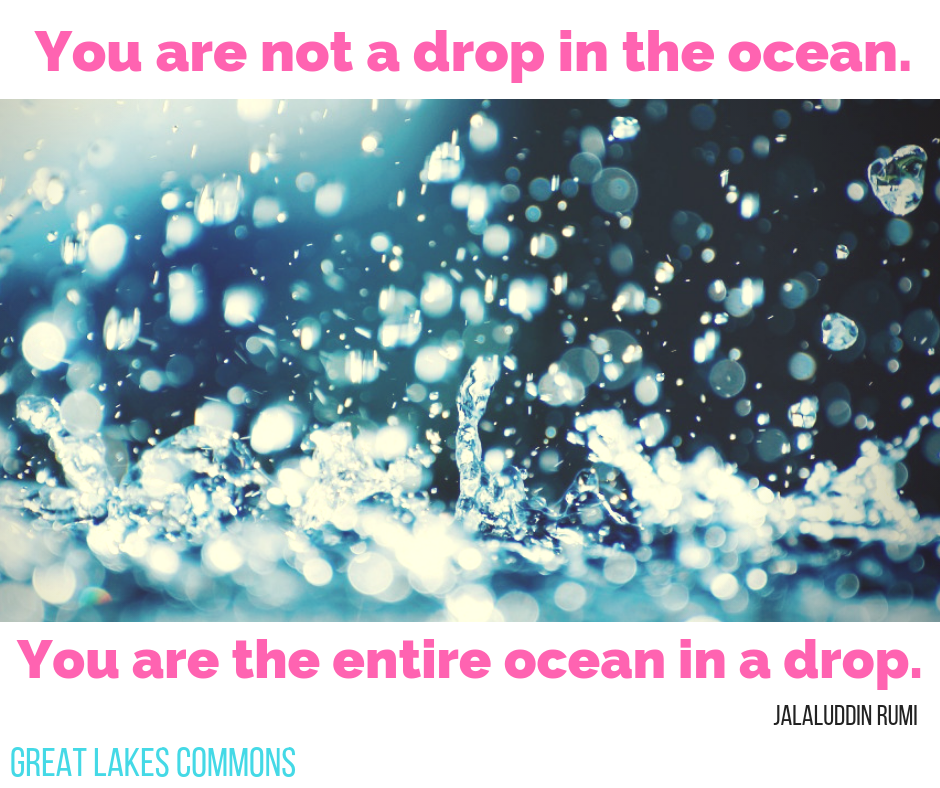We regularly host conversations with community water leaders around the Great Lakes. We hope these conversations enhance connectedness and raise the level of individual and shared commitment.
If you want to host and record a basin-wide circle gathering or a 1-on-1 interview (like Ben Weaver below) please get in touch.
Campfire Circles: exploring issues and examples
After hosting 2 conversations this summer with our GLC community, this post explores 9 principles of Adrienne Maree Brown’s book “Emergent Strategies” as it applies to protecting the Great Lakes. Martin Urbach recently did the same, but from his position as a music teacher. So this post was inspired by Martin’s approach and uses the same 9 ES principles gathered from the book. Let’s inquire what these could mean for a Great Lakes Commons.
On August 28th, we host our second conversation on how to adapt Adrienne Maree Brown’s book “Emergent Strategy” to building a Great Lakes Commons. A handful of us meet from different edges of the basin to share our thoughts. Over the next few months we’ll continue holding space for these ‘emergence’ conversations, since GLC is currently reviewing its role and focus in Great Lakes protection –- two related blog posts are the ones on mapping our movement and unsettling the commons.
This Great Lakes Commons initiative emerged from a confluence of political, emotional, social, and ethical forces that are constantly changing. But how is GLC changing? At the end of July, we invited some of our longest and more curious supporters to talk about what 'emergence' means to them and how GLC can change. The event was inspired by the book Emergent Strategy: shaping change, changing worlds, by Adrienne Maree Brown, since she has laid out many key principles and practices for looking at social movements through the lens of "emergence".
Nestlé's bottled water takings, the privatization of water infrastructure and access to clean affordable water impact Great Lakes communities and Indigenous rights. Residents, Indigenous representatives, and water groups came together in Flint, Michigan last September to oppose the commodification and privatization of water and unsettle water sovereignty.
Over the past year Great Lakes Commons has been working with partners to put together a Charter Toolkit to help communities and individuals protect water as a shared and sacred commons. The Commons Charter inspired the resources developed for the toolkit. The Charter’s themes of personal responsibility, commons governance, water protection, and Indigenous rights (just to name a few) are reflected in this collection of tools.
On December 8, Great Lakes Commons hosted another campfire discussion with supporters across the basin. For the past several weeks and months, everyone concerned about water protection, protecting the sacred, and Indigenous rights have been following this story -- a story pitting people against profits, water against oil, and ceremony and treaty law against state and military power. From the shores of Lakes Ontario, MIchigan, and Simcoe about 10 GLC supporters came together share experiences of visiting the Dakota Nation, the Standing Rock Tribe, and the water protector camps. You can listen to our discussion too.
On November 29, 2016, 12 educators from around the Great Lakes started a conversation on the tools and methods to integrate a 'water curriculum' in shared classrooms and communities. This confluence was organized and hosted by Bonnie McElhinny (University of Toronto) and Paul Baines (Great Lakes Commons). Each participant was asked to talk about their experiences and background in water education and to consider the following questions:
- How do you engage students?
- What is one problem, question, or resource that remains unaddressed or unavailable for you?
- What opportunities do you see for educators and students connecting across the Great Lakes?
There is a common concern around water privatization in the Great Lakes. Commercial bottled water is at the heart of this issue but is also involves looking at public water systems, water access and equity, and legal standards. There are also cultural and societal roles involved. It's a complicated matter that experts and advocates are trying to address. Great Lakes Commons helps connect communities around shared water issues like this. We recently hosted a conversation with experts and advocates from Michigan and Ontario. The goal of the meeting was to identify, learn and share key ideas and strategies on how to address bottled water and water privatizations in the Great Lakes region.
We started with how we arrived at the commons framework and our mutual need for an an integrated approach. For one person this was the combination of working across Canada/USA borders with regional Ojibwe tribes, having a lake-wide perspective lead by many grassroots efforts, participating in discussions about the Rights for future generations, and learning from the leadership of Anishinaabe women.
Interviews with Great Lakes Commoners













We invited Edward George to this talk since he has also been reading Emergent Strategy and feels it has great potential for water protection. He was lifted up hearing people talk from all sides of the Great Lakes showing their care. As a young Anishinaabe man, he started his journey with the sacred water walks and paddling the Great Lakes. He has a close relationship with the Great Lakes and with many people across the region. He’s learned from the land, elders, and those doing the work.